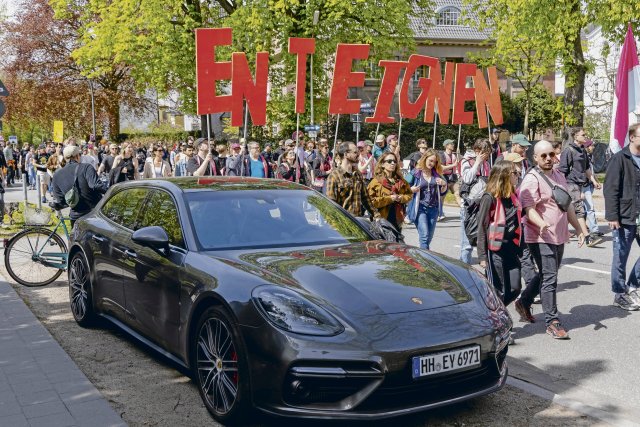The motto for May 1, 2023 in Hamburg was “He who has, gives.”
Photo: imago/Markus Matzel
Dear Sabine, congratulations on the fact that your book “No expropriation is not a solution” is out of stock. Why did you decide not to publish a second edition but to write a new book instead?
The expropriation book has been out of print for a year and was published in autumn 2019. At that time, the Berlin citizens’ initiative “Expropriate Deutsche Wohnen & Co” had just cleared the first hurdle of the referendum it had organized. Two years later, over a million people – 59.1 percent of the valid votes – actually voted for the socialization of real estate companies. So a lot has happened since then.
Has himself Your focus changed against this background?
Yes, sure. The campaign used the term expropriation because it corresponded to the anger of the tenants. Expropriation is not a cozy term, expropriation polarizes. However, the legal basis to which the campaign refers is not Article 14 Paragraph 3 of the Basic Law, which certainly provides for expropriation. It is bourgeois practice that people are expropriated for coal mining or road building. The campaign is based on socialization, which is Article 15 in the Basic Law. This is not expropriation.
Interview
Sabine Nuss is a political scientist, author and journalist. Already in her dissertation »Copyright & Copyriot. Conflicts of Appropriation over Intellectual Property in Informational Capitalism”, which appeared in 2006, deals with the topic of property. Her current book is entitled “Whose Freedom, Which Equality? The promise of a different socialization” and was published by Dietz-Verlag.
But when you wrote the first book, wasn’t it already known that the campaign was based on Article 15?
Yes, but that hardly penetrated the public discourse. This only shifted with the increasing success of the campaign. After the successful vote, the Senate set up a commission of experts to examine the extent to which socialization complied with the constitution. And after a year of review, this commission said: Yes, it is constitutional, and yes, it would help reduce rents. The campaign has woken Article 15 from its slumber. But you can see that since my book the wind has changed, away from expropriation and towards socialization. There are now conferences, more books on the topic will soon be published, and there are new initiatives that take the Berlin campaign as a model. “Expropriate RWE & Co” or “Expropriate Hamburg”, they also refer to Article 15. Recently I even received a request from an initiative called “Vergesellschaftet Bayern!”. It looks as if the current socialization hype is filling the gap that has long existed in the social, progressive movement, a vision that can connect rather than divide and that does not remain trapped in the “anti.”
That’s why your current book focuses on socialization?
The book follows this development to a certain extent. In my expropriation book at the time, I focused on the question of which ideas of property are actually hidden behind the criticism and outrage about expropriation. Here you come across a very widespread ideology relatively quickly, according to which private property guarantees the best of all possible worlds, a world view in which only binary thinking is thought: private property versus public property. And the latter stands for stagnation, mismanagement, lack of efficiency and political lack of freedom. I have dismantled this narrow world of thought. However, I have shortened this part and partially made it more precise. I think it’s important because this ideology is so pervasive: we can all potentially be owners, we are all free to develop ourselves, we all have equal rights to enter into contracts, sell our labor, and so on. Whether and how much property we can accumulate is entirely up to us; everyone is the creator of their own happiness. And this is viewed positively, because by increasing the individual’s utility, he increases the overall utility. This view represents the core of bourgeois ideology.
How do you bridge the gap from ideology criticism to socialization?
By criticizing the way the world is viewed, I assume that it works differently than how it is perceived. This brings me to the analysis of private property, without which, in my opinion, I cannot interpret the socialization article in the Basic Law. Article 15 only consists of two sentences, but essentially it says that “land, natural resources and means of production can be transferred to public ownership or other forms of public economy for the purpose of socialization.” You should already have an idea of what private property is if it is to be transferred to public property. However, the vast majority of people think of private property as just a legal category, and it is often confused with personal property. The economic dimension of property is usually completely ignored. And what common property is, i.e. what socialization actually is, should not be thought to be so self-evident. Article 15 has historically never been implemented.
In your new book you talk about “Vergesellschaftung 2.0”. What do you mean by that?
Socialization was the core demand of the workers’ movement in the November Revolution. The climax of the debate dates back just over 100 years. Since the end of the Second World War, it has faded away in the face of the promise of prosperity of the market economy and the subsequent rise of neoliberalism. At least in the West. Now it is being revived, albeit in a completely different historical context.
Let us return to the historical socialization debate. They say that socialization was never implemented, even though it was the core demand. Why was that so?
I’m not a historian, but when I immersed myself in this time, I was surprised that that was the core demand. You always think that the focus was on the fights for more wages, for works councils, for occupational safety regulations, for reduced working hours and so on. But no, it was the democratization of the economy. I was surprised that there was no clear concept at all as to why this was such a central demand and, above all, that it was already discussed and vehemently criticized at the time. So there were so many different ideas about exactly what socialization should be that contemporaries said there was no concept at all. Working out why this core demand failed would require a more detailed analysis; I have mentioned a few selected possible reasons in my book. One of them was exactly that: in the course of the revolution and after the collapse of a whole of society, a window for significant change opens up historically – and there is no shared idea of how to fill it. Then such a window quickly closes again.
What criticisms of the previous book do you take into account?
I added particular attention to the desire to clarify the argument. For example, my expropriation book did not make it clear enough for some people that private property and the need for growth are two sides of the same coin and that with the historical development of private property, the modern monetary system also developed. You cannot overcome the growth imperative without overcoming the first, and you also need to think more deeply about the role of money in its close connection to private property. In relation to the growth imperative, this means that in the transition from feudalism to capitalism, those in power drove masses of people off their land. This is the history of private property, the land should be used more profitably. To this day, the following applies: increasing the capital employed is an essential characteristic of private property.
What about the relationship between community and society when it comes to questions of property?
If we do not reduce private property to the right to exclude others from something, but also look at the economic dimension, then it quickly becomes clear that we are dealing with a much broader category that gives us the answer to an essential question can give: How do we humans relate to each other regarding the division of labor appropriation of nature? Appropriation of the division of labor also means that people socialize through their work in order to reproduce themselves together, that is, for the purpose of their survival as a community. Or as a society? This is exactly where one stumbles with Marx, who at first glance does not use both terms in their different grammatical applications entirely consistently. The sociologist Ferdinand Tönnies was the first to systematically work out this difference. I only deal with the debate to the extent that it is necessary for me to understand socialization as a theoretical concept.
#ndstays – Get active and order a promotional package

Regardless of whether it is pubs, cafés, festivals or other meeting places – we want to become more visible and reach everyone who values independent journalism with an attitude. We have put together a campaign package with stickers, flyers, posters and buttons that you can use to get active and support your newspaper.
To the promotional package
judi bola online sbobet88 sbobet link sbobet
